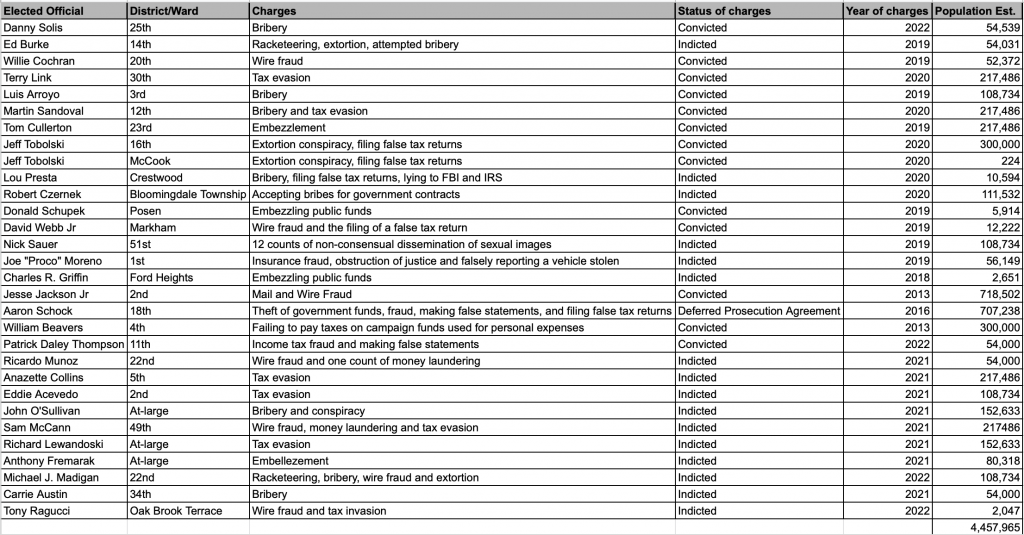For many people it might feel as if time has stood still since 2020 when we entered an unprecedented pandemic, but the number of elected officials charged with crimes while in office has continued to grow. From the top of the food chain, former Speaker of the Illinois House Michael J. Madigan, to little known Plainfield Township Supervisor Anthony Fremarak, the indictments keep rolling in.
Back in 2020, we took a look at how many Illinoisans, since former Governor Rod Blagovich’s conviction, have been represented by an elected official who was indicted or charged with a corruption-related crime while in office. Arguing that the cost of corruption was avoidable, we added up the tally and roughly 3 million people had been represented by an elected official indicted or convicted of illegal activities. Now, that number has grown and is getting close to 4.5 million. Yet, we still don’t see much motivation by our elected officials to address corruption in a meaningful way.

You might recall that, in 2020, the Illinois General Assembly convened a committee to focus solely on ethics reforms. Fast forward to now and the committee still has failed to issue a report on ethics reforms needed despite the hours of committee hearings where badly needed reforms were discussed at length by good government groups and others.
Perhaps you heard about an ethics package that was introduced and approved last year? You’re sure to see fanfare about historic ethics reforms passed into law on many of your campaign mailers this summer. The problem is that the package that was approved failed to address many of the glaring issues brought to light in the committee hearings.
Instead, it included half measures such as a six-month revolving door ban instead of the recommended two-year ban before a lawmaker can start lobbying former colleagues after leaving elected office.
The ethics package that passed put much of the attention on strengthening requirements for lobbyists’ reporting and registration, without addressing how lobbyists and PACs accumulate power through bundling campaign donations for candidates.
In reality, the ethics laws that were approved potentially could make it much more difficult for everyday people to engage with their elected officials through grassroots organizations.
If we want fewer people affected by corruption, it’s time to level the playing field in elections by enacting meaningful, independent redistricting reform – the same reform that Governor J.B. Pritzker campaigned for in the 2018 election.
It’s time to truly address conflicts of interests instead of having the transportation committee chair overseeing and steering one of the largest infrastructure bills in the state’s history, while he also is being investigated – and later convicted – of bribery and tax evasion, as the late former state Sen. Martin Sandoval was at the same time the Rebuild Illinois infrastructure bill was under his control.
We have to get serious about eliminating the Illinois General Assembly as the farm team for lobbying firms so that lawmakers aren’t currying favor with their former colleagues on behalf of private interests instead of serving their constituents. There’s plenty of other ways elected officials can utilize the skills they acquire from serving as state lawmakers that don’t involve influencing their friends and colleagues just a few months after they leave office.
Let’s empower the legislative inspector general to be truly independent and stop relying on federal prosecutors as the only fail-safe to root out bad actors.
Illinois continues to take “first steps” on ethics reforms while avoiding the difficult and complex structural reforms needed to take corruption from a systemic problem to a few “bad apples” who abuse power.
In the middle of everything noted here, our state’s independent legislative watchdog resigned, the nation’s longest-serving Speaker of the House was indicted, and an impeached Governor was pardoned.
We cannot afford to wait for the federal government to build a case on another government official. Let’s take action now to change the narrative and save everyone the heartburn of another elected official abusing their power to the detriment of their constituents and the communities they’re supposed to represent.
